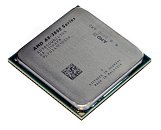Thursday, April 2nd 2015

AMD Faces Securities Fraud Lawsuit
Over-promising and under-delivering with its very first accelerated processing units (APU), codenamed "Llano," is coming back to haunt AMD, with a US District Court ruling that the company must face claims from investors over potential securities fraud. Launched in Q3-2012, AMD's A-series "Llano" APUs went largely unsold due to various factors including lack of product appeal, competition from Intel, forcing AMD to pull in its second-generation "Trinity" APU too soon. The related development first took shape in January 2014.
The swelling unsold "Llano" inventory forced an inventory writedown of $100 million, reducing the company's worth by nearly that much overnight, and tanking the value of the AMD stock. While AMD talked about the concept of an APU for years, Intel was the first to come out with a processor that integrates a graphics processor, with its Core i3 and Core i5 "Clarkdale" processors. The suit claims that AMD misrepresented production of "Llano" chips to its investors despite supply issues from its foundry partner GlobalFoundries, artificially inflating the value of the company in 2011-12. By the time production finally caught up, it ended up overproducing resulting in unsold inventory, and in consequence, the $100 million writeoff.
Source:
Reuters
The swelling unsold "Llano" inventory forced an inventory writedown of $100 million, reducing the company's worth by nearly that much overnight, and tanking the value of the AMD stock. While AMD talked about the concept of an APU for years, Intel was the first to come out with a processor that integrates a graphics processor, with its Core i3 and Core i5 "Clarkdale" processors. The suit claims that AMD misrepresented production of "Llano" chips to its investors despite supply issues from its foundry partner GlobalFoundries, artificially inflating the value of the company in 2011-12. By the time production finally caught up, it ended up overproducing resulting in unsold inventory, and in consequence, the $100 million writeoff.

61 Comments on AMD Faces Securities Fraud Lawsuit
Oh wait..
Missing predictions in tech is a certainty for most companies and many are prone to it.
I also think investors are often little more than parasites who simply gamble and when they lose, they complain like brats. You invest in anything, you take risks. The suit would have to prove an awful lot and I don't think AMD have much to worry about.
EDIT; I've heard many times on many forums from people who claim to prefer AMD because they see them as the number 2, trying harder, making the noble effort to provide the "budget-minded" (poor people) with hardware they can afford, and precisely because they're NOT Intel (the giant uncaring behemoth that's perceived as "laughing all the way to the bank"). All I can say to them is "you get what you pay for", enjoy Pentium 4 level performance in 2015, Intel had it in 2005...
BTW, AMD's always been about hype and bullspit: look how they count their "cores", that's BS on a fundamental level. Now they do it with GPU "cores" as well.
A copy of the court's denying the motion to dismiss filing can be read at regmedia.co.uk/2015/04/01/amd_no_dismissal.pdf , it contains some interesting snippets.
Anyway, sorry for wandering off topic.
I just hope this doesnt turn into some Intel vs AMD BS, i've had several AMD chips and Intel, apart from synthetic i never saw a massive difference. Even the reviews of 4k give the FX 8 core some glamour!
Neither AMD nor any other company has an obligation to tell investors the proprietary production issues they may experience. The fact that AMD adjusted their product release dates as they experienced production set-backs shows they were not defrauding investors at all. Unless the plaintiffs can pull a real snow job on a jury, I doubt they will prevail in this attempt to be compensated for gambling on AMD to deliver new tech and new products on time. This lawsuit is an attempt to use the judicial system to reimburse bad investing by plaintiffs, IMO and I hope it fails.
Llano wasn't bad. Heck I built a Llano rig for a relative that is still in use today and runs well. Only major downside is that AMD changed the socket for the next gens so it has no real upgrade path.
Unfortunately, I see no future for them unless the likes of Samsung buys them out and gets around that x86 licence clause that prevents the bought out company from using it. Perhaps anti-trust laws could apply to this clause, too?
The x86 licence/cross-licence agreement allows for a buyer to retain the licence for a year to allow for negotiations on licence renewal. So instead of a hostile suit/countersuit trade embargo situation, any transference is smoother - along the lines of when National Semiconductor sold its x86 licence to VIA.
I doubt Samsung has any interest in x86, and even if they did, ramping R&D to a level that Intel are already at would probably exceed the purchase price of AMD by a considerable margin.
The prime reason I could see for Samsung purchasing AMD wouldn't be for x86/x86-64, but for graphics IP, since that is an area Samsung has interest in. Strangely enough, AMD's position would become stronger if Nvidia succeeds in its suit against Samsung and Qualcomm. If Nvidia enforces it's graphics IP as licensable, then AMD's would also be in the same position, thus raising their value. AMD already has long term cross-licences with Nvidia for graphics IP, and purchasing AMD would likely mean a transfer of those cross-licences to Samsung and a means to avoid paying fees to Nvidia. With that in mind, AMD's value improves proportionally with any potential settlement levied against Samsung in its suit with Nvidia.